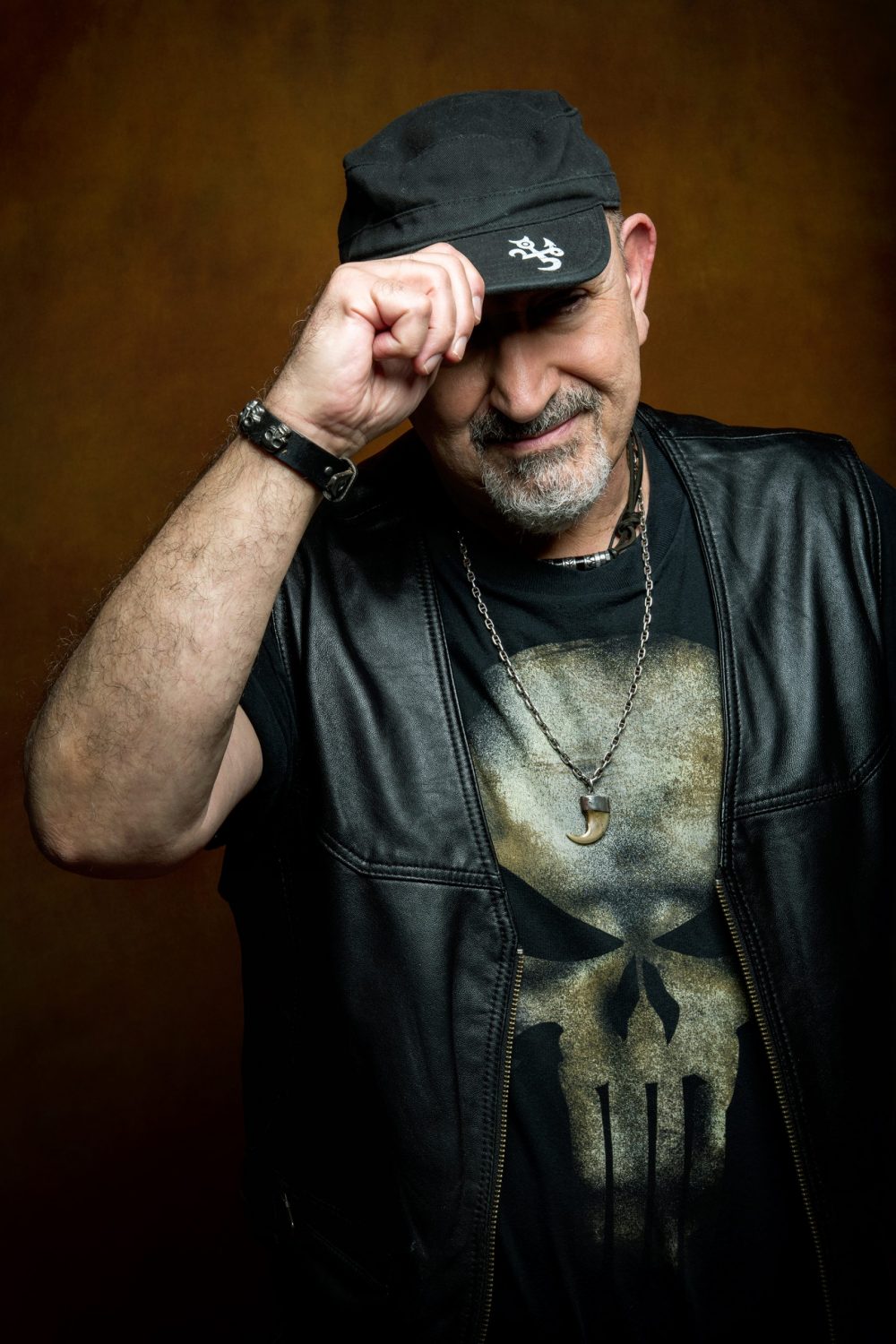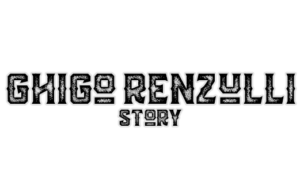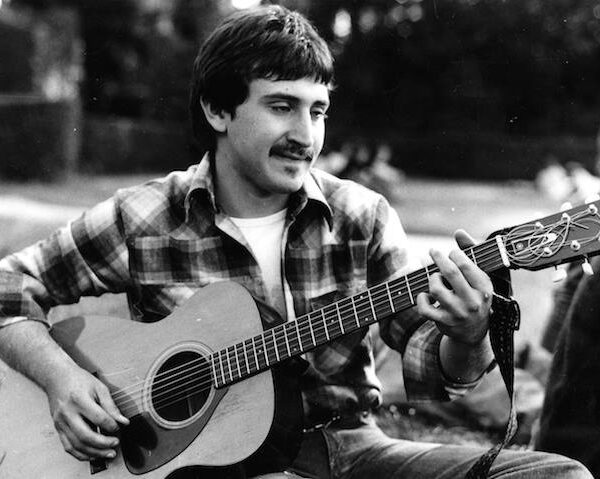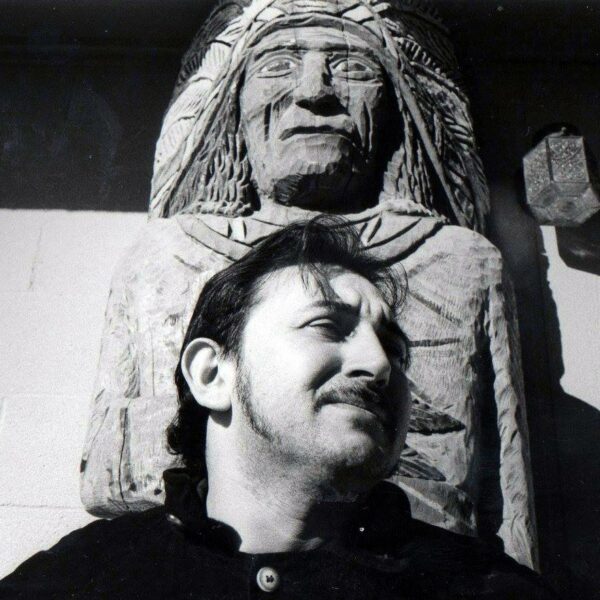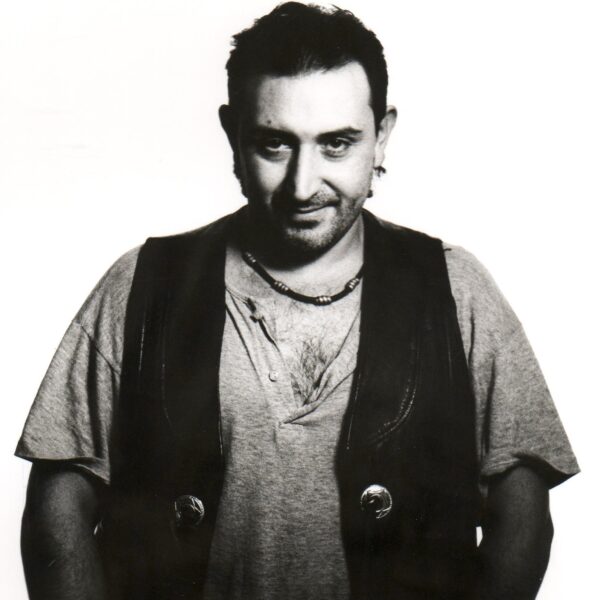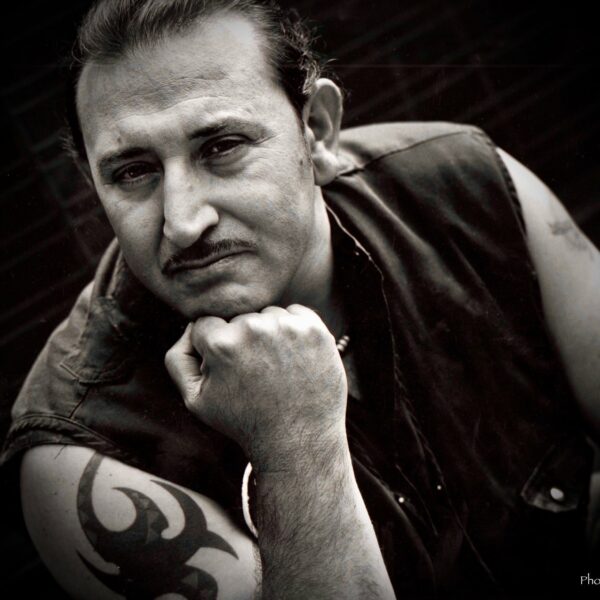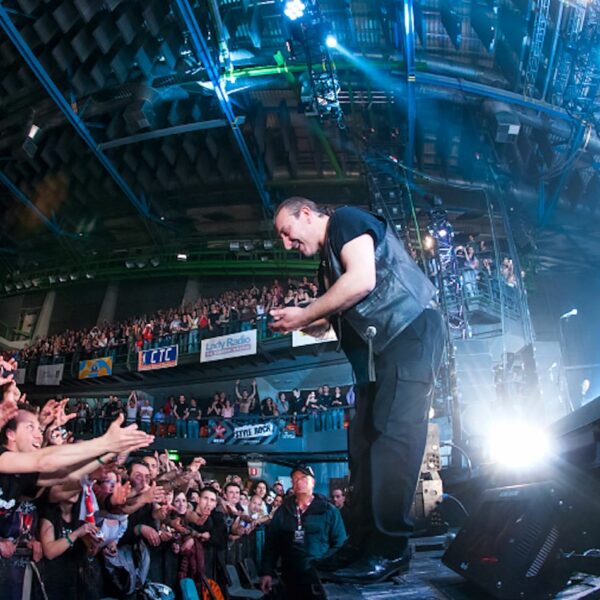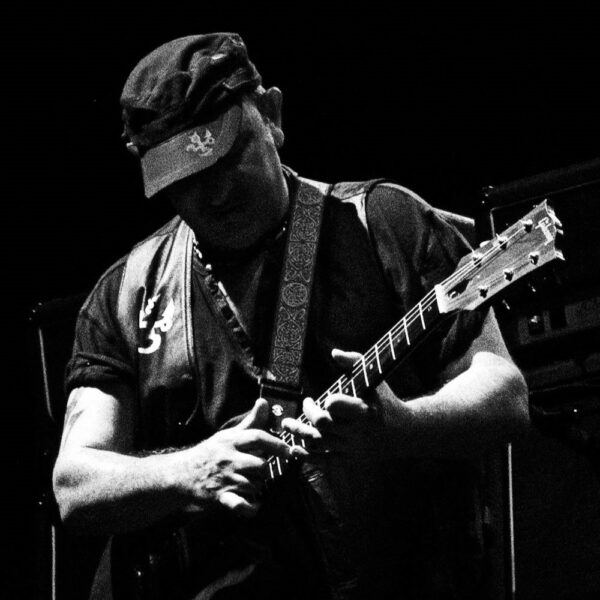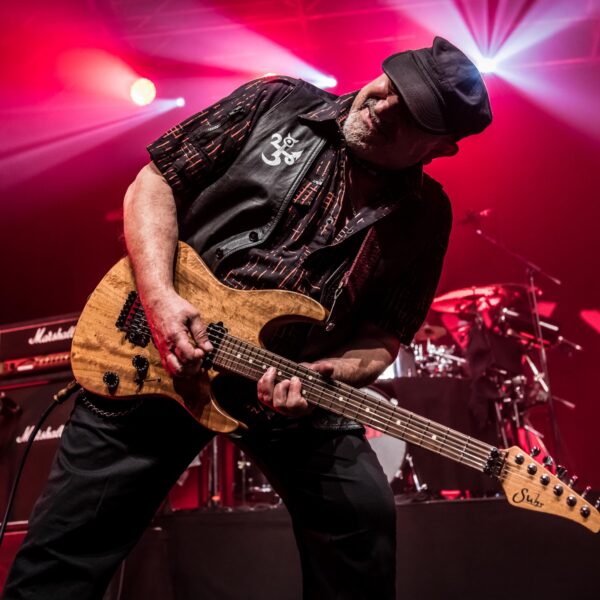Federico “Ghigo” Renzulli was born in Manocalzati (AV)
on the 15th of December, 1953
and later moved with his family to Florence.
During his adolescence he listened to a lot of music,
in particular folk, blues, rock and country.
His passion for music inspired him to pick up a guitar
for the first time at the age of fourteen.
After high school he enrolled in the faculty of Biology but,
a few exams before obtaining his degree,
he decided to abandon his studies to dedicate himself to music.
In 1976 he moved to London, which at that time was in full punk era,
where he lived for two years.
At the end of 1978, he returned to Florence, formed a band and founded
Cafè Caracas together with Raffaele Riefoli (Raf) on vocals and bass.
They rehearsed in the cellar in via dei Bardi n. 32
which Ghigo personally renovated.
The band had the opportunity to be heard by the general public
at the opening of the Clash concert in 1980 with 100k present.
After the concert, bad feelings began within the band
which lead to a break-up.
A few days later, Ghigo received a phone call from Gianni Maroccolo,
who was also rehearsing with his group in via dei Bardi.
They decided to form a new band with Antonio Aiazzi
on keyboards and Francesco Calamai on drums.
Ghigo initially played the guitar and sung but, after a while
they decided to opt for a singer, and Piero Pelù joined the band.
“LITFIBA”, the name chosen by Ghigo for the band,
made its live debut on 6th of December, 1980.
After that first concert many others came, including the one
opening for Siouxie and The Banshees in Florence.
In 1982 the first major confirmations arrived for Litfiba,
such as the award at the “Il Rock Mette i Denti” festival
and the release of the first EP ”Guerra”.
In 1983 the album “Eneide” was released,
a technological reinterpretation of Virgil’s epic poem,
brought to the stage by the Krypton theater company.
In 1984 the EP “Yassassin” was released and in 1985
Litfiba’s first LP album was published: “Desaparecido”.
The group conquered the covers of Rockerilla and Mucchio Selvaggio,
and embarked on a new tour with concerts also in Europe.
In 1986 the EP “Transea” and a double album “17 Re”
were published, which became a milestone in Italian music.
The subsequent and very long “17 Re Tour”
ended on the 12th of May, 1987 at Tenax in Florence.
The recording of the concert was published on the live album
“12-05-87 (Aprite i vostri occhi)”.
The following year “Litfiba 3” was released,
the last album of the Power Trilogy
started by “Desaparecido” and continued with “17 Re”.
With the departure of Maroccolo and Aiazzi from the band,
a historical period of the group comes to an end.
Ghigo, Piero and Ringo de Palma remain Litfiba.
“Pirata” was released in the autumn of 1989. It was the first Litfiba album
distributed by a multinational and was a great success,
leading the band to obtain their first gold record.
On the 1st of June, 1990 Ringo de Palma died prematurely.
In November 1990 “El Diablo” was published, entirely arranged by Ghigo.
The album was a huge success, selling more than 500,000 copies.
At that point Litfiba are identified as the couple: Ghigo and Piero,
as they will be in the years to come.
The long promotional tour was a great success
and Litfiba effectively moved from the underground scene
to the mainstream in a very short time.
In 1992 “Sogno Ribelle” was published,
a collection of their historical songs
revisited with the same type of arrangements adopted for “El Diablo”,
Including some live versions, and an unreleased song.
“Terremoto”, another Italian music milestone,
was released at the beginning of 1993 followed by a long tour,
that will only be published on DVD in 2015.
The audio testimony of the Terremoto Tour
is the live “Colpo di Coda”, released in 1994,
containing two unpublished songs, “A denti stretti”, and “Africa”.
It’s a real, lively and expressive show,
where everything is at maximum power.
Also in 1994, a new album of unreleased songs arrived,
“Spirito”, produced by Rick Parashar and followed by a long tour
which was documented in the subsequent project “Lacio Drom”,
in CD and VHS versions.
During the foreign dates, comparing themselves with European realities,
Ghigo and Piero began to be dissatisfied with their sound,
and started to think about modernizing it with electronics.
“Mondi Sommersi” saw the light at the beginning of 1997,
after a production that lasted the entire previous year.
The VHS “Croce e Delizia” was recorded from the ensuing tour,
the proceeds of which were donated to charity for the populations
affected by the earthquake in Umbria and the Marche.
while the double live version was recorded
at the last Italian stage of the tour “Croce e Delizia”.
“Infinito” was released at the beginning of 1999, it’s
the band’s greatest commercial success but at the same time the
relationship between Ghigo and Piero was increasingly tense
and rumors of splitting up were circulating.
At the Monza Rock Festival, on the 11th of July, 1999 the concert was held,
and represents the epilogue of a 19-year history.
With a letter on the band’s website,
Ghigo announces his desire to continue,
and that he is already in the process of composing the next
Litfiba album with a new singer, Gianluigi “Cabo” Cavallo.
The first album of the new Litfiba is “Elettromacumba”,
which was published in January 2000, and it was a great success,
and the tour kept the group busy until the end of the summer.
At the end of that year, 15 live tracks were made available
for free download, a real novelty for the Italian market;
they were then collected in the “Live On Line” box set.
“Insidia”, artistically produced by Ghigo,
saw the light at the end of 2001,
followed by a tour in 2002 which included over 100 concerts.
In 2003, a song was created, with an accompanying video clip,
for the soundtrack of the Italian version of
“Tomb Raider 6 – The Angel Of Darkness”: “Larasong”.
“Essere o Sembrare” was released in April 2005.
It’s a deliberately minimal album,
but the workmanship of which highlights some problems
in internal relationships.
At the end of 2006 Ghigo decided to break up the band.
Ghigo reformed the band with Filippo Margheri on vocals.
The composition and recording of the album began, a
nd in September 2008 the video of “Effetti Collaterali”
was released online,
a song that was then re-proposed in the live EP “Five On Line”
with two unreleased songs (“Sepolto vivo” and “Terra di nessuno”)
and two other historical songs, available for free download.
On the 11th of December, 2009,
with a statement on the group’s official website,
Ghigo and Piero announced their Réunion.
The live debut takes place with a mini tour in Italian sports halls,
preceded by a brief warm up abroad.
The double live “Stato Libero di Litfiba”
is extracted from the two concerts in Florence,
which also contains two unreleased studio songs.
A long tour followed consisting of several tranches,
including a European one in March 2011.
On the 17th of January, 2012 the album “Grande Nazione” was published.
On the 1st of June, 2012 at the Mandela Forum in Florence,
a special event was celebrated
and a concert organized in memory of Ringo,
in which many of the musicians who played in Litfiba in past years participated, including Antonio Aiazzi and Gianni Maroccolo,
historical members of the early formation.
In September of the same year,
Litfiba took part in “Italia Loves Emilia”,
a concert that aimed to raise funds for the victims of the earthquake
that hit Emilia a few months earlier.
In November 2012, Ghigo opened his personal Facebook page,
which he uses to communicate with fans.
Shortly afterwards it was announced that
Litfiba would play again together with
Gianni Maroccolo and Antonio Aiazzi,
for a tour celebrating the 80’s repertoire.
The 2013 tour is sold out.
The Milan dates in January were recorded
and published on the double CD (and triple vinyl)
“Trilogia 1983 – 1989 (Live 2013)”.
In 2015 it’s time for a new tour
dedicated to the Tetralogy of the Elements of the 90’s, which,
preceded by the release of the historical DVD of the Terremoto tour,
continued sold out until the end of the summer.
In November 2016 “Eutopia” was released,
preceded by the single “L’Impossibile”,
a song born from “La danza di Minerva”,
written by Ghigo and dedicated to the memory of Carlo U. Rossi,
which was also included in the vinyl version of album.
“La danza di Minerva” can be considered
the first instrumental piece of the new No_Vox project.
The tour in support of Eutòpia starts in March 2017
and ends in September of the same year.
Ghigo subsequently dedicated himself
to writing his autobiography “40 anni da Litfiba”
published with Arcana publishing house in November 2020,
and to his new instrumental project No_Vox,
with the release of two albums:
“CINEMATIC” in 2020 and the live “ALCAZABA” in 2021.
At the end of 2021 Litfiba announced “L’Ultimo Girone”,
the tour that celebrated 42 years of activity of the band,
and which ends on the 22nd of December 2022
at the Mediolanum Forum in Milan.
Ghigo is currently busy recording
No_Vox’s new album of unreleased songs.
